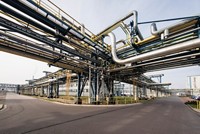Advertisement
Grab your lab coat. Let's get started
Welcome!
Welcome!
Create an account below to get 6 C&EN articles per month, receive newsletters and more - all free.
It seems this is your first time logging in online. Please enter the following information to continue.
As an ACS member you automatically get access to this site. All we need is few more details to create your reading experience.
Not you? Sign in with a different account.
Not you? Sign in with a different account.
ERROR 1
ERROR 1
ERROR 2
ERROR 2
ERROR 2
ERROR 2
ERROR 2
Password and Confirm password must match.
If you have an ACS member number, please enter it here so we can link this account to your membership. (optional)
ERROR 2
ACS values your privacy. By submitting your information, you are gaining access to C&EN and subscribing to our weekly newsletter. We use the information you provide to make your reading experience better, and we will never sell your data to third party members.
Business
BASF to buy Solvay’s nylon business for $1.9 billion
Deal provides back integration to adiponitrile, a key raw material
by Alex Scott
September 20, 2017
| A version of this story appeared in
Volume 95, Issue 38

In a transaction involving two of Europe’s biggest chemical makers, BASF has agreed to acquire Solvay’s global nylon business for $1.9 billion.
The business is the world’s third-largest maker of nylon engineering plastics, with annual sales of $1.6 billion and pretax profits of about $240 million. It predominantly makes nylon 6,6, a polymer with applications in automotive, electronics, and other markets.
BASF says the purchase will give it greater access to growth markets in South America and Asia. Additionally, the deal will strengthen BASF’s nylon 6,6 supply chain by bringing the key raw material adiponitrile, which BASF now purchases. The two firms plan to complete the sale in the third quarter of 2018.
Solvay acquired the nylon business in 2011 as part of its $4.8 billion purchase of the French chemicals firm Rhodia. It employs approximately 2,400 people, half of whom are located in France. It has 12 production sites, four R&D hubs, and 10 technical support centers.
Solvay’s move mirrors those of Honeywell and Solutia, both of which exited the nylon sector in the past few years.
Nylon has become more profitable recently, Solvay says. Nevertheless, the firm is ditching it as part of a long-term strategy to focus on higher-value specialty chemicals. The divestment “marks a tipping point in the profound transformation journey we began four years ago,” says Solvay CEO Jean-Pierre Clamadieu.
Meanwhile, Solvay says it has no plans to divest its hydrogen peroxide or soda ash operations, commodity businesses that in 2016 generated total sales of about $2.5 billion. These businesses have scale and technological advantages and generate cash with little exposure to economic cycles, says Solvay board member Pascal Juery.



Join the conversation
Contact the reporter
Submit a Letter to the Editor for publication
Engage with us on Twitter